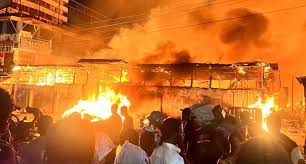By Alex Ababio
TECHIMAN, Ghana —Adwoa Serwah’s scarred hands sift through the ashes of her 10-acre mango orchard as the acrid smell of burnt fruit hangs heavy in the air. “This was my children’s inheritance,” she whispers, crushing a charred Keitt mango—a variety prized in European markets. “Now it’s ghost fields.” Her farm in Tuobodom, a village near Techiman in Ghana’s agricultural heartland, vanished in January 2025 when a neighbor burning cassava stalks lost control. Harmattan winds—hotter, drier, and arriving six weeks earlier than a decade ago—transformed agricultural waste into a firestorm that devoured 14 farms in 90 minutes
The Burning Trap
For generations, Techiman’s farmers cleared fields with controlled burns. “Fire is our tractor,” explains cassava processor Kofi Boateng, gesturing at mounds of rotting mango peels outside Techiman Central Market. But climate change has weaponized tradition:
– *Rainfall has dropped 30% since 2020, desiccating crops into tinder
– Temperatures now spike to 42°C during Harmattan season
– 300+ tons of weekly market waste—with no municipal composting—pile up in fields
When farmer Yusif Adams lit a routine post-harvest burn in November 2024, flames jumped to his neighbor’s mango nursery. “Twelve thousand seedlings—gone,” Adams says, showing mobile photos of charred saplings. “One fire erased my €15,000 loan.”
Mango Graveyard
The fires have ravaged Techiman’s “Golden Belt”:
– $4.7 million in mango exports lost in 2024
– 40% yield reduction projected for 2025
– **8,000+ farmers* financially crippled
Farmer Ama Nyarko’s hands bear burns from salvaging fruit. “These mangoes flew to Paris. Now I trade them for painkillers,” she says, sorting blighted produce. Her insurance claim? Denied due to “act of God” clauses .
Systemic Sparks
Four institutional failures magnify the crisis:
1. Policy Paralysis : Ghana’s 2015 open-burning ban has seen **zero fines issued** in Techiman since 2020 .
2. Abandoned Infrastructure : Rusting irrigation pipes lie unused near Gbilugu, where December fires raged unchecked after the lone regional fire truck broke down .
3. Funding Irony: A $125.9 million World Bank resilience program approved in April 2025 allocated **nothing for fire prevention** in Bono East .
4. Data Darkness : No government studies on Harmattan intensification—even as satellite data confirms **fire season extended by 47 days since 2018 .
*”We call it ‘controlled burn,’ but with 30% less rain? Nothing’s controlled anymore.”*
— **Dr. Ama Mensah , Agronomist, Kwame Nkrumah University
The Human Torch
In Tuobodom, 34-year-old Adwoa Serwah embodies the crisis. After her farm burned, she accepted exploitative work at a cassava plant—stoking the same fires that destroyed her livelihood. “I burn peels for 10 cedis daily,” she says, stirring embers beneath a drum. “The smoke chokes my children, but hunger chokes louder.” Her story reveals a cruel cycle: climate refugees forced into practices that accelerate environmental collapse .
The Fire Weavers
Amid the ashes, women forge solutions. Efua Badu, 54, leads the Nsuo Tɔ* (Water Fire) collective—training farmers in:
– *Biochar conversion*: Sealed drums transform waste into fertilizer
– **Firebreak cooperatives**: Shared flame barriers between farms
– SMS harmattan alerts : Early warnings to donated phones
“We turned this season’s waste into 3 tons of fertilizer,” Badu says, sifting rich black compost. Yet her 200-member network covers just 2% of Techiman’s farmland—starved of government support .
Neighbor Against Neighbor
Tensions exploded in December 2024 when cassava farmer Kwame Asare confronted Yusif Adams over embers that ignited his field. “We used to share harvests,” Asare says, showing machete scars. “Now we trade blame.” The conflict mirrors violence in Shelanyili, 200km north, where bushfire bans sparked fatal clashes in 2025 .
Extinguishing or Igniting?
Ghana’s Fire Service launched “Operation Stop Burning” in March 2025—posters urging “Don’t Burn Waste!” while standing before Techiman’s 2-meter-high waste mounds. Boateng scoffs: *”How can they lecture us while garbage chokes our children?”* Municipal collections ceased in January due to funding cuts .
Meanwhile, climate models predict Bono East’s dry seasons will lengthen by 15 days per decade**. “Without systemic intervention,” warns Dr. Mensah, “Techiman’s breadbasket becomes a dust bowl by 2040” .
Seeds in the Smoke
Chief Nana Kwaku Sarpong remembers when Harmattan meant “cool winds and hopeful planting.” Now, he brokers emergency land leases for 47 displaced farmers. Where Adwoa’s orchard perished, green shoots spear charcoal earth:
“Adwoa replanted with Efua’s drought-resistant seedlings,” he says. But as she tends the saplings, Adwoa’s question hangs heavy: “Will the winds wait?” Around her, 800 young trees dig roots into fire-ravaged soil—each a battle flag in an unwinnable war against a changing sky.

